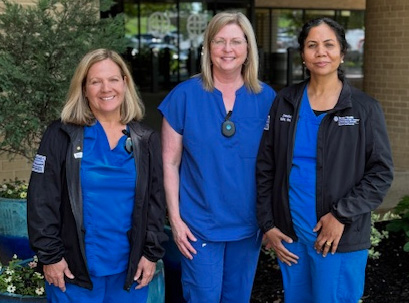A South Carolina man flew to Dallas-Fort Worth for Thanksgiving, a family reunion and his birthday. The eagerly anticipated trip was especially strenuous because kidney issues had put him on a transplant list, and he required dialysis.
While at the DFW Airport, he collapsed. Paramedics brought him to Texas Health Harris Methodist Hospital Hurst-Euless-Bedford, which has a contract with the airport. He was admitted to the ICU.
“One of our nurses told me, ‘He’s missing everything he came here to do,’” said Reina Rhodes, R.N., a discharge lounge nurse.
So, Rhodes went to the hospital’s Make a Memory closet, which contains items they used to make patients’ hospital stays more comfortable. After selecting a pair of soft socks, a blanket and writing material, she went to the hospital gift shop and bought balloons and, because the patient was diabetic, some sugar-free candy.
Rhodes and her fellow ICU nurses signed a birthday card for him, which they presented along with the goodies.
“There were a lot of tears shed,” said Rhodes. Kidney issues run in her family, and she had donated a kidney to her husband “We prayed with him. He told us how grateful he was for all we were doing.”
Similar scenarios play out regularly as part of Texas Health’s Make A Memory program, which encourages nurses and other care team members to connect with patients and brighten their lives in ways that have little to do with their health issues.
But Texas Health HEB’s association with DFW Airport lends itself to more travel-related circumstances than other hospitals and thus, different ways to ease the trauma of what patients might be going through.
“It’s a unique patient population, because they don’t even live here,” said Anne Wainwright, B.S.N., R.N., OCN, who works in the hospital’s discharge lounge. “They sometimes don’t even make it here with their luggage because it’s still on the plane. We make sure they get all the personal items they need.”
 When a mother, concerned about her little boy, called 911 during a layover on their trip to Oklahoma, the two were taken to Texas Health HEB. Everything checked out fine, but the family missed their connecting flight. They didn’t speak English, which made the situation even tougher. But Gabrielle Segovia Acton (pictured right), licensed ER paramedic, stepped up to translate flight information and arrange transportation back to DFW.
When a mother, concerned about her little boy, called 911 during a layover on their trip to Oklahoma, the two were taken to Texas Health HEB. Everything checked out fine, but the family missed their connecting flight. They didn’t speak English, which made the situation even tougher. But Gabrielle Segovia Acton (pictured right), licensed ER paramedic, stepped up to translate flight information and arrange transportation back to DFW.
One more roadblock: The mom needed a car seat. Staff members called local police and hospital departments looking for one. When Segovia Acton heard this, she didn’t hesitate: She offered her own son’s car seat, telling them to keep it.
“That made me feel great,” she said. “I was so happy and relieved that they could get home safely.”
Travelers put time and effort into their plans, Rhodes said, “and it’s so hard to have them kicked out from under you. What we do shows, ‘I have a heart for you.’ This is why we go into nursing; this is why we do what we do.”
